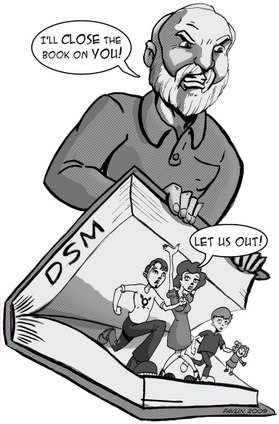Is diagnosing mental illness counterproductive?
The Diagnostic and Statistical Manual of Mental Disorders has been published since 1952 by the American Psychiatric Association to identify and classify mental disorders. The fifth edition was just released, and its publication has brought diagnostic psychiatry to the forefront of discussion.
Perhaps the most astounding criticism comes from a book published by Allen Frances, former chairman of the DSM Task Force and professor emeritus and former chair of the Department of Psychiatry and Behavioral Science at Duke University School of Medicine. His book’s title sums up the crux of the debate: “Saving Normal: An Insider’s Revolt Against Out-of-Control Psychiatric Diagnosis, DSM-5, Big Pharma, and the Medicalization of Ordinary Life”. Frances told Wired: “With an assist from an overly ambitious psychiatry, all human difference is being transmuted into chemical imbalance meant to be treated with a handy pill. Turning difference into illness was among the great strokes of marketing genius accomplished in our time … Human difference was never meant to be reducible to an exhaustive list of diagnoses drawn carelessly from a psychiatric manual.”
A diagnosis from the DSM book is required by insurance companies in order for patients to receive mental health coverage. In a roundup of books about the DSM USA Today the last version, DSM-IV, has been worth about $5 million a year to the group in book sales and related materials. The new version costs $199 for hardcover and $149 for the paperback. It’s big business for everyone from big medicine to big pharma.
But many are arguing that humanness is lost in diagnosis. Mel Schwartz, who we’ve covered before (here and here), discusses what he calls “Diagnosis Disorder”, saying “What you look for is what you’ll find.” He argues: “As with all diagnoses, when we confuse the description with being an actual entity, we trick ourselves and exacerbate the problem.” Instead of delineating tendencies of behavior and personality as well as emotional and psychological patterns to facilitate understanding and treatment, we as a clinical society are looking for a quick-fix.
Of course, there is no quick-fix to complex psychological problems with complex causes and manifestations. Like happiness, each case is individual and often cyclical. We applaud the quality psychotherapists and psychiatrists speaking out to support an individualized understanding and approach to mental health.

